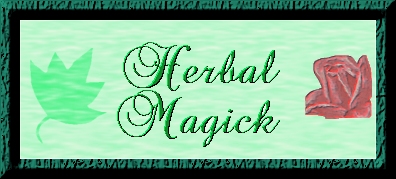

Herbs are used in a variety of ways. They are often used in spells and rituals to attract or repel certain qualities. They can be used with candles, burned, used in a wash or infusion, used on the altar to honor a specific deity, or carried in a spell bag.
Different herbs possess different types of energies. Many herbs possess energies that can be used for several different things. Herbs each correspond to an element and planet. Sometimes the whole plant is used for something and other times, only a part of the plant is used. Sometimes different parts of the plant are used for different things. Some herbs are sacred to certain deities. These are all things to consider when selecting a herb for a spell or ritual. if you use more than one herb, it is best to use an odd number. The exception to this would be if you were choosing one herb to represent each element, then you would use only four. I realize that some may not agree with this, but I think it is OK. If you wanted to stick to an odd number of herbs, you could choose 2 corresponding to the element you wish to be predominant in the ritual, thus making five, or you could choose a herb sacred to the deity you plan to call on, if any.
This is a short list of correspondences just to give you an idea. This is by no means a complete list, just examples. These correspondences are not for internal use.
Protection: Vervain, Sandalwood, Mistletoe, Pepper, Basil, Tarrogon, Oak, Pine, Cedar, Garlic, Lavender, Fern
Healing: Rosemary, Onion, Apple, Pine, Vervain
Peace: Rose Petals, Vervain, Lavender, meadowsweet, Valerian (fair warning, this one doesn't smell too good)
Prosperity: Chamomile, Irish Moss, Cedar, Cinnamon, Ginger, Onion, Orange.
Success: Ginger, Lemon Balm
Luck: Clover, Fern, Irish Moss, Orange
Again, these are just examples, it is by no means a complete list. If you are interested in herbal magick, in my opinion the best resource is Cunningham's Encyclopedia of Magickal Herbs by Scott Cunningham. It contains in depth information on each herb and it's properties.
Storing your herbs
I store the herbs I have for magickal purposes separate from the ones I use for cooking. I think it is best to do it this way, as I do not like different energies getting on my ritual supplies. However, some people keep them altogether. the choice is yours, based on what you feel is right.
Last but not least, before you bring any herb or plant into your home, you need to know 2 things. First off, that you actually have the herb you think you have. Many plants look very similar. You need to be able to positively identify the herb you have. Second, you need to know whether or not it is poisonous. This is precisely why knowing exactly what you have is so important. If you have children or pets, it is best not to bring poisonous herbs into your home. There is almost always a nonpoisonous herb that can be substituted for a poisonous one in a ritual with equally good effects. Also, bear in mind that some plants that are not toxic to humans are toxic to pets. If you have pets, you should obtain a list of plants that are toxic to the type of pet you have. Also, do not think that putting an herb in a container with a lid will keep your pet from getting it. My cat had been getting into the catnip I use for rituals, so I switched to a container with tight fitting lid. It did not look as though it would be possible for him to get it off. The next day, he came running to me with the lid in his mouth. So please be careful with both children and pets, if you feel you absolutely must use a poisonous herb, consider storing it outside or in a locked cabinet. Mark the container clearly with the name of the herb and mark it as poisonous. You should wash your hands after to using any poisonous herb, as well as anything that herb has touched.
Charging
Herbs should be charged for the type of spell or ritual you are using them in. you can do this by holding the quantity of herb you plan to use in your dominant hand, and visualizing what you wish to accomplish. Concentrate on sending that type of energy into the herb.
A Simple way to use Herbs
Most herbs can be carried dried in a spell bag for the purpose of protection or attracting specific energies. You can use a ready made spell bag, or you can make your own. I think it is a good idea to make your own, especially from some type of cloth that belongs to you as it will make it more yours, but either way will work. If you use cloth from something that belongs to you, make sure it has not been previously owned.
To make your own, you will need a piece of cloth large enough to hold the quantity of herbs you wish to carry and a length of cord long enough to tie the end. Cut the cloth in a circle, put a pinch of each herb in the center, fold the edges together, and tie it off with the cord. If you plan to carry it for a long period of time, it's best to replace the herbs at least once every 2 weeks. Be sure and use dried herbs, otherwise they may get moldy.